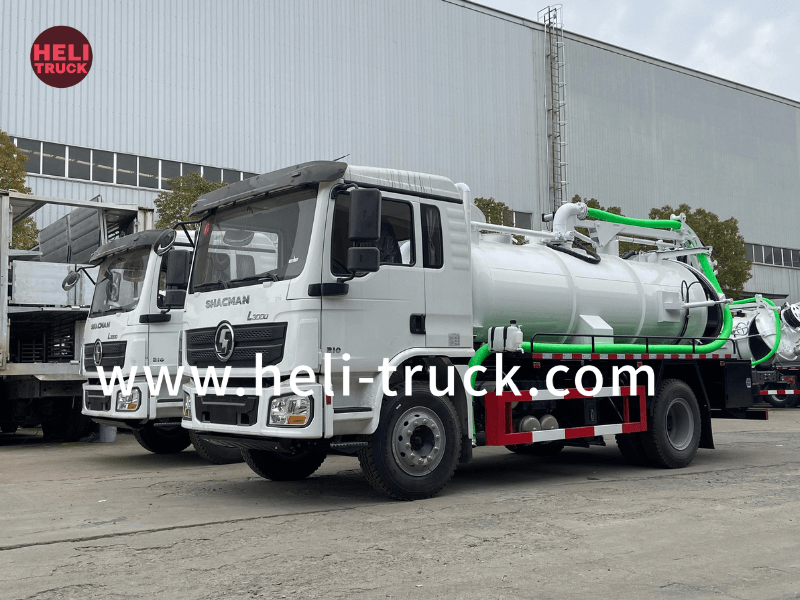Introduction
In the realm of waste management and sanitation services, efficiency is key to ensuring clean and healthy communities. Garbage compactor trucks play a crucial role in streamlining waste collection processes, increasing productivity, and promoting environmentally friendly practices. This article delves into the world of garbage compactor trucks, exploring their design, functionality, benefits, and impact on waste collection efficiency.
1. Evolution of Waste Collection

Waste collection has been an essential service in urban areas for centuries, with various methods used to gather and dispose of garbage. From manual collection by workers to horse-drawn carts and motorized vehicles, the evolution of waste collection has been marked by a continuous quest for efficiency and sustainability.
2. The Role of Garbage Compactor Trucks
Garbage compactor trucks, also known as compactors or trash compactors, are specialized vehicles designed to collect and compact solid waste efficiently. These trucks are equipped with hydraulic systems that compress garbage to reduce its volume, allowing for more waste to be transported in each trip. By compacting the waste, these trucks help optimize the use of space and resources, leading to cost savings and improved operational efficiency.
3. Design and Components of Garbage Compactor Trucks
Garbage compactor trucks come in various sizes and configurations to suit different waste collection needs. The key components of these trucks include the compactor body, hydraulic system, compaction mechanism, loading hopper, and control panel. Work truck maintenance is typically made of durable materials such as steel and is equipped with a compaction chamber where the waste is compressed. The hydraulic system powers the compaction mechanism, which consists of a blade or plate that compresses the waste. The loading hopper is where the waste is deposited into the compactor, while the control panel allows the operator to monitor and control the compaction process.
4. Types of Garbage Compactor Trucks
There are several types of garbage compactor trucks available, each designed for specific waste collection requirements. Rear loader compactors are commonly used for residential waste collection, as they can be easily maneuvered in narrow streets and alleys. Front loader compactors are ideal for commercial and industrial waste collection, as they can handle large volumes of waste efficiently. Side loader compactors are often used for collecting waste from bins placed along the roadside, offering convenience and flexibility in waste collection operations.
5. Benefits of Garbage Compactor Trucks
Garbage compactor trucks offer numerous benefits that contribute to waste collection efficiency and overall environmental sustainability. Some of the key advantages of using these trucks include:
- Increased Capacity: By compacting the waste, garbage compactor trucks can transport larger volumes of garbage in each trip, reducing the number of trips required and optimizing collection routes.
- Improved Hygiene: Compacting the waste helps contain odors and prevent leakage, minimizing the risk of contamination and promoting a cleaner and healthier environment.
- Reduced Environmental Impact: By maximizing the use of space in the compactor body, these trucks help reduce the carbon footprint associated with waste collection, leading to lower fuel consumption and emissions.
- Enhanced Safety: Garbage compactor trucks are designed with safety features such as backup cameras, alarms, and safety interlocks to protect operators and pedestrians during waste collection operations.
6. Waste Collection Efficiency and Cost Savings
Garbage compactor trucks play a vital role in enhancing waste collection efficiency and achieving cost savings for municipalities and waste management companies. By reducing the number of trips required to collect a given volume of waste, these trucks help optimize collection routes and schedules, leading to lower operational costs and increased productivity. Additionally, the compaction of waste reduces the need for additional disposal sites and landfill space, further saving on disposal costs and minimizing environmental impact.
7. Impact on Recycling and Waste Diversion
While garbage compactor trucks are primarily used for collecting and transporting solid waste to disposal facilities, their design and functionality can also support recycling and waste diversion initiatives. Some compactor trucks are equipped with separate compartments for recyclable materials, allowing for the efficient collection and segregation of waste at the source. By promoting recycling and waste diversion, these trucks contribute to resource conservation and sustainable waste management practices.
8. Maintenance and Operational Considerations
To ensure optimal performance and longevity, garbage compactor trucks require regular maintenance and servicing. Routine inspections, lubrication of moving parts, and monitoring of hydraulic systems are essential to prevent breakdowns and ensure safe operation. Proper training of operators is also crucial to maximize the efficiency of these trucks and minimize downtime due to operator error or mishandling.
9. Future Trends and Innovations
As technology continues to advance, the waste management industry is witnessing the emergence of new trends and innovations in garbage compactor trucks. Electric-powered compactors are gaining popularity due to their environmental benefits and reduced noise pollution. Autonomous compactor trucks equipped with artificial intelligence and robotics are being developed to enhance operational efficiency and safety. Additionally, smart sensors and data analytics are being integrated into compactor trucks to optimize waste collection routes and schedules based on real-time data.
10. Conclusion
Garbage compactor trucks play a vital role in maximizing waste collection efficiency, promoting sustainability, and enhancing public health and safety. By compacting solid waste and optimizing collection routes, these trucks help reduce operational costs, minimize environmental impact, and support recycling initiatives. As the demand for efficient waste management solutions continues to grow, garbage compactor trucks will remain a cornerstone of urban sanitation services, driving innovation and progress in the field of waste collection.
In conclusion, garbage compactor trucks are indispensable tools for modern waste management practices, offering a range of benefits that contribute to cleaner, greener, and more efficient communities. By investing in these specialized vehicles and embracing new technologies and best practices, municipalities and waste management companies can achieve significant cost savings, operational efficiencies, and environmental sustainability in their waste collection operations.
